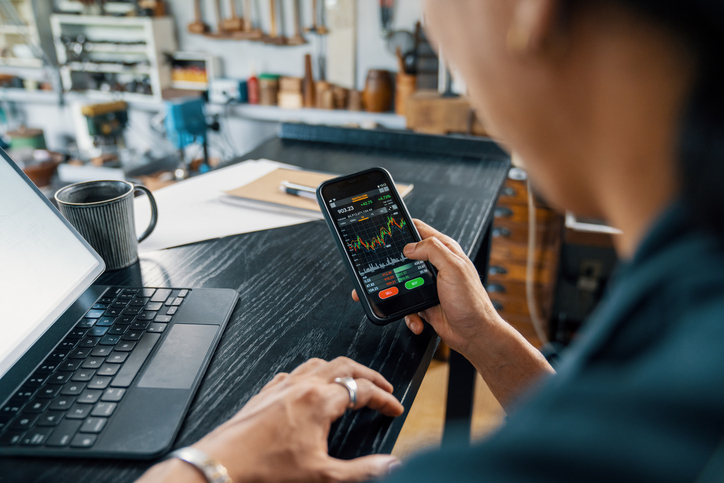
- According to Bloomberg, the total cryptocurrencies market surpassed $2 trillion in April of 2021. Of that amount, $1 trillion is in Bitcoin.
- While Bitcoin and Etherum have the most notoriety in the world of crypto, there are many types of cryptocurrencies in which to invest – but it’s important to do your due-diligence
- Young investors are advised to limit their exposure to cryptocurrencies to no more than 10 percent of their holdings. Veteran investors getting close to retirement are advised to keep crypto to 5 percent of their portfolios.
Launched on January 3, 2009, Bitcoin, the world’s leading and most recognizable cryptocurrency, has rapidly evolved into an asset class that can be bought, sold and traded. For those who are attracted to the potential of cryptocurrencies as an alternative investment, it’s important to recognize that the crypto market is both young and still developing. While the possible upside is quite enticing, the asset’s volatility makes the conceivable downside pretty steep too. With that in mind, let’s take a look at some typical investment mistakes with crypto and how to avoid them.
Cryptocurrency vs Traditional Investments
According to Bloomberg, the total cryptocurrencies market surpassed $2 trillion in April of 2021. Of that amount, $1 trillion is in Bitcoin. That this much value has accrued in only 13 years has many potential investors eyeing what looks to be the 21st century equivalent of a gold rush with the thought to give it a larger place in their portfolios.
As attractive as crypto is, it’s important to realize there are some key differences between crypto markets and stock markets. The first of these is that stocks are backed by equity in the business in which you invest, entitling you to a percentage of its assets and cash flow.
What Drives the Value of Traditional Investments?
Meanwhile, a stock’s price adjusts based upon assessments of the future success of the firm issuing it. Does the organization have a new product that will give it a competitive edge in its marketplace? Has a shift in management made the company more competitive? Has something happened in the world that will make its products more desirable now — or in the future?
A huge part of being a successful investor is understanding the nature of your investment. You should have a good idea of what will drive the growth of the underlying entity. It’s difficult to calculate the true value of an investment without this information.
What Drives The Value of Crypto?
Cryptocurrency, on the other hand, is backed only by the moods of investors. In other words, with but one exception (stablecoins), there are no hard assets underlying cryptocurrencies. This makes them difficult to predict, as their prices are predicated upon the notion that someone will always want to buy more of them in the future. Understanding this, it’s useful to look at some of the most common cryptocurrency investment mistakes.
1. Succumbing to FOMO – Fear Of Missing Out has led many to make decisions they go on to regret. When it comes to crypto, the rapid rise in value it has experienced since its inception may lead to concern you’ve missed “getting in on the ground floor”.
However, this is a very young market with considerable potential for growth left in it.
There is also plenty of potential for another crash.
The value of Bitcoin stood at $67,900 per coin in November of 2021. The price, as of this writing (February 2022) stands at $39,264. That’s a drop of $28,636 in less than four months.
The cryptocurrency market is extremely volatile. Understanding that before investing is critical, as is keeping your emotions in check. The smart play is to set a goal and invest only what you can comfortably stand to lose.
2. Going “All In”
Of course, the other side of the volatility concern is the idea a significant price gain could be “right around the corner”. This thought has been known to lead some investors to go all in on an asset. The problem here is an all or nothing bet could leave you with nothing.
Young investors are advised to limit their exposure to cryptocurrencies to no more than 10 percent of their holdings. Veteran investors getting close to retirement are advised to keep crypto to 5 percent of their portfolios.
3. Borrowing to Invest
Again, the volatility of the crypto market makes this a bad idea. In a market as speculative as this, you could wind up with considerable debt in addition to the loss of the personal capital you invested. As stated previously, never invest more than you can afford to lose without compromising your lifestyle.
4. Failing to Diversify
While Bitcoin and Etherum have the most notoriety in the world of crypto, there are many types of cryptocurrencies in which to invest. Known in the marketplace as “altcoins”, some are predictably more solid than others.
Investing solely in Bitcoin, because it’s the oldest and best known, is a mistake, just as giving your entire portfolio over to Apple would be. One sharp downturn in that particular asset could wipe you out. Placing all of your eggs in one basket is one of the most common cryptocurrency mistakes.
5. Expecting to Get Rich Quick
As is true with most things tech, early adopters who invested well have realized extraordinary gains with cryptocurrency. However, they did not achieve those gains overnight.
There is no easy money to be made in crypto.
Still, because it is relatively new, cryptocurrency draws a lot of amateurs looking to make a quick score. Toward that pursuit they often tend to overtrade, which can cost them an accumulation of fees and bad trades. When things don’t pan out, they lose faith and sell.
This desire for quick profits can also open investors to potential cryptocurrency scams. As with most investment vehicles, the best plan is to carefully invest in a solid currency and hold on to it for a while.
5. Investing Without Conducting Due Diligence
The need to do your research before investing is true of any asset class and especially so with crypto. Because it is so new, there will invariably be market shakeouts from time to time. The more solid players will potentially last, the weaker ones will potentially falter.
Study any currency before you decide to buy into it. You should also look into the reputation of anyone who contacts you with a brilliant crypto investment opportunity. Take some time to review the price charts, get familiar with the history of your targeted investment and make your projections as best you can.
6. Overlooking the Security Component
As database systems go, the blockchain platform is one of the most secure ever devised. Cryptocurrencies rely upon this technology to record transactions and make them viewable to anyone so all parties in a transaction can agree upon the value of the currency.
However, a database is only as secure as its most lax user.
Key codes used to conduct transactions and access funds in the system must be carefully protected. Crypto exchanges are favored targets of hackers, because that’s where the money is. Avoid leaving your coins in exchanges for long periods of time.
Users also have a “digital wallet” in which their holdings are stored. These wallets can be offline (cold) as well as online (hot). Experts recommend keeping your holdings in an offline wallet, to minimize the possibility of an interloper hacking into a database and robbing you.
Along these same lines, you should create a specific email account with two-factor authentication for your cryptocurrency investments. It is also a good idea to use a specialized two-factor authenticator rather than phone, email or text message authentication. You’ll also want to choose a username and password with no ties to any personally identifiable information. Hackers routinely exploit this type of data to gain access to networks.
7. Losing Passcodes
According to an article in The New York Times, a trader lost $25 million in Bitcoin when one of his colleagues reformatted the hard drive on his laptop. Another crypto investor is said to be just two wrong passcode attempts from being locked out of a bitcoin wallet with $240 million in digital currencies. It is estimated that $140 billion in Bitcoin lies similarly inaccessible. Passwords must be difficult to crack, but easy to remember.
8. Conducting Mobile Transactions
Convenience can be a good thing — absolutely. Sadly though, what’s convenient for you in this case can also be convenient for thieves. Data transmitted to and from mobile devices is notoriously easy to intercept. Conducting trades, or storing large sums on a mobile device opens your holdings to inordinate risk.
9. Using Inferior Exchanges
It is absolutely imperative to shop exchanges carefully before deciding to use one. Practices and fees vary from exchange to exchange. Remember, crypto is an unregulated alternative investment. There is no FDIC or SEC protection backstopping you.
10. Conflating Exchanges and Wallets
Exchanges are where trading and transactions take place. Wallets are where cryptocurrency assets are stored. You’ll need passcodes to access either, however holdings left in exchanges are more vulnerable to loss. Exchanges have been known to go down and they can also get hacked. Leaving digital currencies in an exchange is exposing them to the potential for theft.
As mentioned above, wallets come in two varieties — “cold” and “hot”. Hot wallets exist online, cold wallets are offline. Hot wallets make access easier for newbies — and hackers. Cold wallets, while less convenient to use, can be isolated from the internet, rendering them less susceptible to intrusion.
These are ten of the typical investment mistakes with crypto trading and advice for how to avoid them. Another approach to diversifying your portfolio is investing in alternatives with Yieldstreet. There, you’ll find a curated selection of alternative investment opportunities that were previously only available to institutions and the ultra-wealthy. Whether you’re looking to generate income, grow your overall portfolio value, or some combination of both, Yieldstreet offers a variety of alternative investment opportunities. Take a look around the site now to see what you could accomplish with the platform.
What's Yieldstreet?
Yieldstreet provides access to alternative investments previously reserved only for institutions and the ultra-wealthy. Our mission is to help millions of people generate $3 billion of income outside the traditional public markets by 2025. We are committed to making financial products more inclusive by creating a modern investment portfolio.






